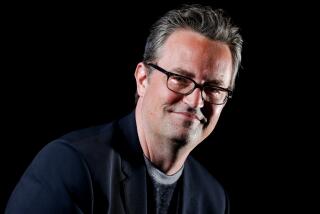Jacksonâs drug use started after Pepsi commercial, attorney says
With fortunes and reputations at stake, attorneys began opening statements Monday in a downtown Los Angeles courtroom where a powerful entertainment giant stands accused of playing a critical role in the death of entertainer Michael Jackson.
The wrongful-death suit filed by Katherine Jackson and her grandchildren -- Prince, Paris and Blanket -- accuses AEG of negligently hiring and controlling Dr. Conrad Murray, who administered a fatal dose of the anesthetic propofol to Jackson shortly before he was to begin his âThis Is Itâ comeback concerts in London.
Brian Panish, the attorney representing the pop singerâs mother and children, told jurors in opening statements Monday that Jackson had developed a problem with prescription medication and at times became âdependentâ on the drugs.
PHOTOS: Jackson-AEG wrongful death case
Jackson, the attorney said, also suffered from anxiety that âbecame more prevalent when he was going through a rigorous schedule.â
The entertainerâs drug problem, Panish said, took off in 1984 when he suffered second and third-degree burns while filming a Pepsi commercial.
The wrongful-death suit contends the entertainment firm threatened to end Jacksonâs career if he failed to come through with the concerts and ordered Murray to keep the performer on track.
FULL COVERAGE: AEG wrongful death trial
AEG, which owns Staples Center in addition to other arenas and sports venues, maintains it was Jackson who insisted that Murray come on board as his doctor.
The trial begins after three weeks of jury selection in which potential jurors were vetted to determine whether they were even able to sit on a case that could last up to four months. Six men and six women were impaneled last week, and six alternates were also named.
As in life, Jacksonâs eccentric lifestyle is expected to take center stage as attorneys poke though the entertainerâs once-massive fortune, his voluminous medical history and the final days when he was attempting to pull off what was being sold as a series of stunning comeback concerts in London.
While Jackson had only agreed to 50 dates in London, AEG proposed a three-year worldwide tour in which one executive estimated ticket sales could exceed $450 million. Billboard magazine estimated AEGâs profits would hit $115 million for the London shows, with Jackson earning $1 million a night.
According to the contract between them, AEG advanced Jackson close to $30 million, which included a $15-million line of credit, a $5-million advance, $7.5 million to cover production costs to mount the shows and rent for a $100,000-a- month Holmby Hills mansion.
According to the lawsuit, if the singer failed to generate enough money to pay back the loans, AEG could seize his assets, among them a valuable song catalog that includes songs by the Beatles, Aretha Franklin and the Jackson family.
The lawsuit contends that AEG knew of Jacksonâs fragile health but put âits desire for massive profits from the tour over the health and safety of Michael Jackson.â
âThree loving children lost their father, a loving mother and father lost their son, the Jackson siblings lost their brother and the world lost its most celebrated entertainer,â the complaint said.
A central question will be who actually employed Murray: Jackson or AEG?
The Las Vegas doctor, deep in debt himself, was supposed to be paid $150,000 a month. Murray, who worked with Jackson for two months to prepare him for the concerts, signed a contract the night before Jacksonâs death but it was never signed by AEG executives nor the singer.
The entertainment firm, along with company executives, argues that it was Jackson who hired Murray and insisted on keeping him as his doctor.
AEG is an influential political player in Los Angeles, stamping its reputation by building L.A. Live and Staples Center and now working with the city to construct a downtown NFL stadium to help attract a pro football team. But the company has been in upheaval for months, with owner Philip Anschutz putting it on the market and then just as suddenly pulling it off.
The list of potential witnesses in the wrongful-death case is guaranteed to bring out the paparazzi and gossip traffickers. Jacksonâs mother and father, siblings and other relatives -- close to 20 Jacksons in all -- are expected to testify. So are Michael Jacksonâs children.
Also on the witness lists are performers Diana Ross and Prince; Quincy Jones, who produced Michael Jacksonâs âThrillerâ album; filmmaker Spike Lee; Jacksonâs former wives, Debbie Rowe and Lisa Marie Presley; AEG owner Anschutz; and one-time Hulk Lou Ferrigno, who was Jacksonâs trainer.
ALSO:
New courtroom drama over Michael Jackson
Trial for 1987 murder of Jimmy Casino to wrap up
Michael Jackson-AEG: Fans line up to watch wrongful-death trial
More to Read
Sign up for Essential California
The most important California stories and recommendations in your inbox every morning.
You may occasionally receive promotional content from the Los Angeles Times.











